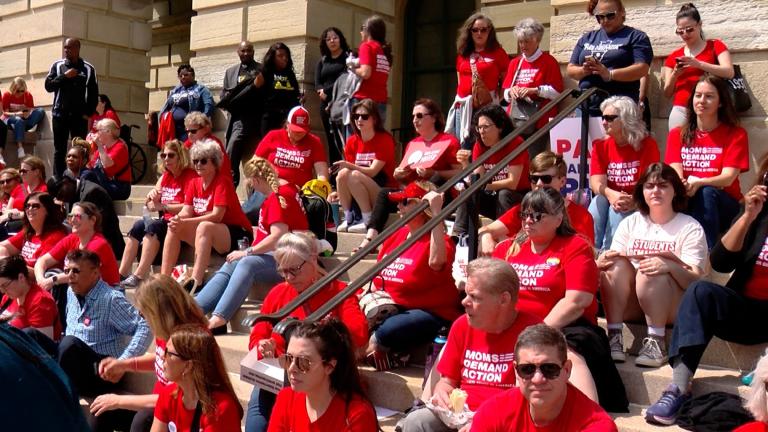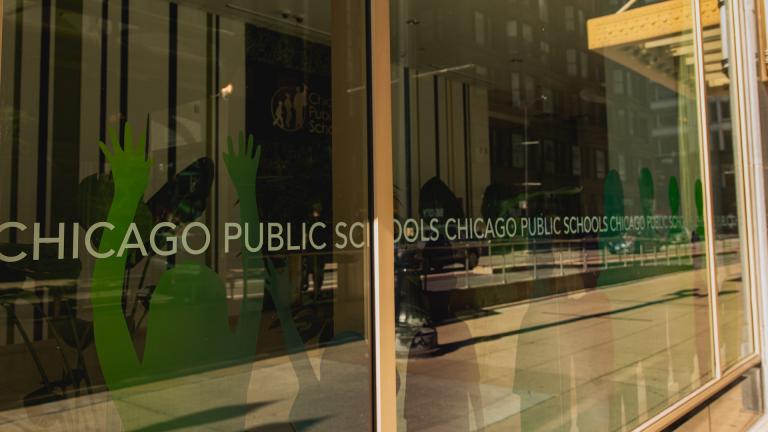Illinois is infamous for political corruption and has a bad reputation for fiscal malfeasance.
Backers of a new state budget say they’re turning that around with a balanced plan crafted in cooperation. Republicans, however, say the measure that passed the state House of Representatives around 2:30 a.m. Friday — while most Illinois residents were kicking off a sunny holiday weekend — largely ignores their input and sets the state up for obligations it won’t be able to meet.
The spending plan doesn’t increase taxes, but it will cost people $10 more for a new car title. That means come July, it will cost $165 for a certificate of title, with the additional funds to be used to update the Illinois secretary of state’s IT infrastructure, which an external assessment found to be very outdated. The secretary of state’s office said the increase “won’t come close” to raising the $200 million needed to overhaul the “archaic” system “to better protect personal information, increase cybersecurity and prevent outages … but is a decision the GA (General Assembly) made to help generate more for modernization.”
That’s a small portion of the $50 billion spending plan approved by lawmakers and that Gov. J.B. Pritzker is expected to sign in advance of July 1, when the new fiscal year begins.
State Rep. Jehan Gordon Booth, a Peoria Democrat who led negotiations for House Democrats, called the budget “responsible” and “compassionate,” even if the package doesn’t meet all requests.
“No one in here, no one in communities, is going to get everything they ask for because we simply don’t have the resources to do everything that everyone is asking,” Gordon Booth said. “The things that we are engaging in, we believe that we can sustain over time.”
A few Democrats voted against the package, as did every Republican.
One freshman lawmaker, Rep. John Egofske, R-Lemont, a former mayor and company CFO, said watching how the $50 billion plan was put together was “enlightening and frightening.”
Lawmakers behind the plan promised it contains no gimmicks, but Barrington Hills Republican Rep. Martin McLaughlin said “there’s more hiding, shifting, obfuscation of stuff that would make a three-card monte dealer blush,” and Rep. John Cabello, R-Rockford, said projected savings are “straight out of fantasy land.”
Critics said the budget fails to account for costs of a yet-to-be settled new contract for AFSCME union members; relies on Pritzker slicing in half spending on a health care program for undocumented residents they don’t believe he’ll be able to feasibly or politically accomplish; and defies a state law that requires elected officials’ salary bumps to be curbed mid-term at 5%.
Under the budget, legislators and constitutional officers will see their pay go up by 5.5%, meaning the base for a General Assembly member will be $89,675.
Republican Rep. C.D. Davidsmeyer of Jacksonville complained that while hospitals will see their reimbursement rate increase in January by 10%, it’s not enough to keep struggling rural medical centers from “hemorrhaging dollars,” even as he said that the spending plan is riddled with $150 million in giveaway “pork” projects, which he alleges were given as enticements for votes.
“The priorities are giving people just enough so you’re not hurting ‘em, and then giving yourself stuff that helps you get reelected,” Davidsmeyer said. “And that’s what disgusts me around here, is it seems like people are willing to put ‘yes’ votes on things because they are going to personally get something out of it.”
But backers said the plan is balanced and could net Illinois a ninth credit rating upgrade. The plan puts $200 million beyond what Illinois is required by law to send to its pension funds, increases the rate paid for ambulance trips, sets aside money for Firearm Owners Identification card and concealed carry license processing, funds two new classes of Illinois State Police cadets and continues the AIM HIGH merit-grant for in-state public universities.
“If you want to vote for credit upgrades for the state of Illinois, if you want to vote the public school children in your district, vote aye,” Gordon Booth said. “If you want to vote to fund the cities, towns and villages in your district, vote aye.”
With the budget taken care of, the legislative session is adjourned until fall.
“We’ve gotten a lot of great things done for the people of Illinois,” House Speaker Emanuel “Chris” Welch said. “When you look at those things, those things have been done in blue districts, in red districts, Democratic districts, Republican districts. We’ve gotten great things done for everyone.”
But there’s disagreement about that, too.
Republican Rep. Ryan Spain said that after watching the “ComEd Four” trial revolving around former House Speaker Michael Madigan — which saw four of the utility company’s former executives or lobbyists convicted of corruption — it’s crazy action wasn’t taken on ethics.
“It is said that budgets reflect our priorities, and, boy, I just cannot believe it, that we don’t all of us place a priority on cleaning up the corruption that has been such a deep stain on the state of Illinois,” Spain said.
A measure will go to Pritzker that forbids campaign contributions from the embroiled red light camera industry and that excludes elected officials from lobbying for red light camera companies immediately upon leaving office.
The legislature also punted on helping the Chicago Bears football team with its expected move to Arlington Heights; meeting requests from people of color struggling to break into the marijuana market in Illinois; and taking the next steps with establishing a Chicago elected school board.
Follow Amanda Vinicky on Twitter: @AmandaVinicky








